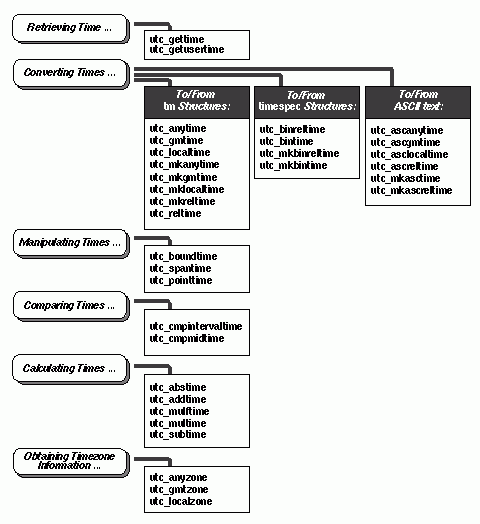
The following figure categorizes the DTS portable interface routines by function.
DTS API Routines Shown by Functional Grouping

An alphabetical listing of the DTS portable interface routines and a brief description of each one follows:
· utc_abstime
Computes the absolute value of a binary relative timestamp
· utc_addtime
Computes the sum of two binary timestamps; the timestamps can be two relative times or a relative time and an absolute time
· utc_anytime
Converts a binary timestamp into a tm structure by using the TDF information contained in the timestamp to determine the TDF returned with the tm structure
· utc_anyzone
Gets the time zone label and offset from GMT by using the TDF contained in the input utc
· utc_ascanytime
Converts a binary timestamp into an ASCII string that represents an arbitrary time zone
· utc_ascgmtime
Converts a binary timestamp into an ASCII string that expresses a GMT time
· utc_asclocaltime
Converts a binary timestamp to an ASCII string that represents a local time
· utc_ascreltime
Converts a binary timestamp that expresses a relative time to its ASCII representation
· utc_binreltime
Converts a relative binary timestamp into two timespec structures that express relative time and inaccuracy
· utc_bintime
Converts a binary timestamp into a timespec structure
· utc_boundtime
Given two UTC times, one before and one after an event, returns a single UTC time whose inaccuracy includes the event
· utc_cmpintervaltime
Compares two binary timestamps or two relative binary timestamps
· utc_cmpmidtime
Compares two binary timestamps or two relative binary timestamps, ignoring inaccuracies
· utc_gettime
Returns the current system time and inaccuracy as an opaque binary timestamp
· utc_getusertime
Returns the time and process-specific TDF, rather than the system-specific TDF
· utc_gmtime
Converts a binary timestamp into a tm structure that expresses GMT or the equivalent UTC
· utc_gmtzone
Gets the time zone label, given utc
· utc_localtime
Converts a binary timestamp into a tm structure that expresses local time
· utc_localzone
Gets the time zone label and offset from GMT, given utc
· utc_mkanytime
Converts a tm structure and TDF (expressing the time in an arbitrary time zone) into a binary timestamp
· utc_mkascreltime
Converts a null-terminated character string, which represents a relative timestamp, to a binary timestamp
· utc_mkasctime
Converts a null-terminated character string, which represents an absolute timestamp, to a binary timestamp
· utc_mkbinreltime
Converts a timespec structure expressing a relative time to a binary timestamp
· utc_mkbintime
Converts a timespec structure into a binary timestamp
· utc_mkgmtime
Converts a tm structure that expresses GMT or UTC to a binary timestamp
· utc_mklocaltime
Converts a tm structure that expresses local time to a binary timestamp
· utc_mkreltime
Converts a tm structure that expresses relative time to a binary timestamp
· utc_mulftime
Multiplies a relative binary timestamp by a floating-point value
· utc_multime
Multiplies a relative binary timestamp by an integer factor
· utc_pointtime
Converts a binary timestamp to three binary timestamps that represent the earliest, most likely, and latest time
· utc_reltime
Converts a binary timestamp that expresses a relative time into a tm structure
· utc_spantime
Given two (possibly unordered) binary timestamps, returns a single UTC time interval whose inaccuracy spans the two input timestamps
· utc_subtime
Computes the difference between two binary timestamps that express either an absolute time and a relative time, two relative times, or two absolute times